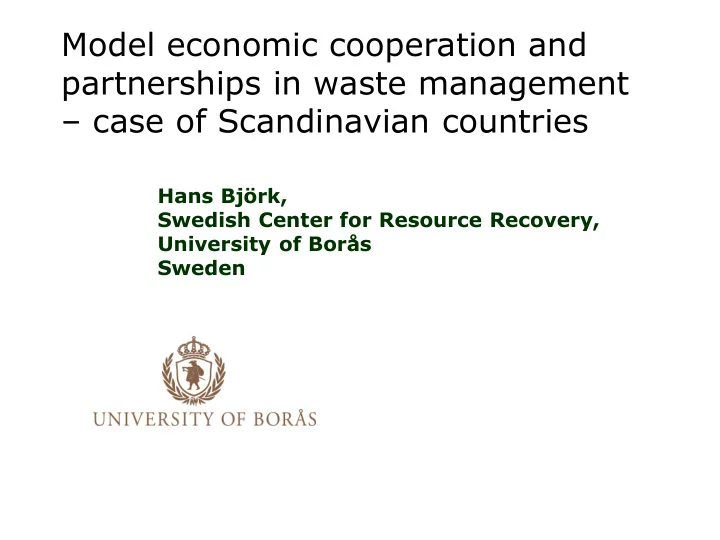

Model economic cooperation and partnerships in waste management – case of Scandinavian countries Hans Björk, Swedish Center for Resource Recovery, University of Borås Sweden
Sweden Population: 9,4 million Area: 450 000 km 2 Member of European Union
Treatment of household waste in Sweden 2,6 million 4,4 million tonnes tonnes
Poltical drivers concerning waste 1991 Municipal waste treatment plan 1994 Producers ’ responsibility 2000 Landfill tax (35 USD/tonne, today 60 USD/tonne) 2000 Landfill ban on combustible waste 2002 EU: Landfill directive 2002 EU: Waste incineration directive 2005 Landfill ban on all organic waste
Poltical drivers concerning waste 2006 Incineration tax on combustible waste 2008 Waste Framework Directive (incl waste hierarchy) 2008 EU: All landfills have to fulfill the landfill directive 2010 Incineration tax is removed 2010 50 % of household waste to material recycling (incl biol treatment) 2013 EU: Waste prevention programmes established 2018 50 % of food waste to biological treatment (40 % energy recovery)
Amounts of waste to landfills (tonnes)
Waste hierarchy
Roles within waste management Waste generator: Households: Separation and leave/transport waste at indicated collection points Companies/Industries: Management of own generated waste Municipalities: Producers: Collection and treatment of Real estate owners: Collection and treatment of municipal waste Space for waste separation waste within the Producers Information to households Responsibility Contractors: Transport and treatment of waste
The municipality ´ s responsibility and organisation The municipality is responsible for - collection and treatment of household waste - Including similar waste from restaurants, stores, offices, etc Municipalities deal with their responsibility in different ways and design their own waste management organisation Administration: Almost 50% have formed municipal waste management companies Collection of municipal waste: 30% inhouse operation 70% contractors Treatment of municipal waste: 35% inhouse operation 65% contractors, mainly municipally owned
Regional waste management companies
Packaging and newspaper collection Uncoloured glass Metal Coloured glass Newspaper Paper/cardboard Plastic – soft/hard
Packaging and newspaper collection 77 stations in Borås
Material recycling Plastics Metal Flower pots, parts 68 26 Engine parts, to car industry, % % tins etc construction materials, plastic bags etc Cardboard Glass 75 92 New cardboard Bottles and % % boxes, coating on isolation gypsum boards material Newspaper and toilet paper
Recycling centres
Recycling centers - Reuse/Secondhand - Bulky waste - Garden waste - Hazardous waste - Electronic waste - Inert waste
Household collection - curbside
2 household bins Organic Combustible
Biological treatment Anaerobic digestion Composting
Waste-to-Energy plant
Mix of fuels Waste Biofuel Bio oil Lost heat Gas oil Oil Electricity Recycled heat The plot shows the mix of fuels to the electricity and heat production. Fossil free fuels stands for 91%
Economy for Waste to Energy in Sweden Model results indicate that waste incineration is expected to be an economically competitive alternative for district heating production during the studied period up to the year 2030. This provides that the national need for this waste treatment method will be met.
Sobacken Waste Management Facility BiologicalTreatment Hazardous waste Weighing station Contaminated Reception Soils Treatment Landfill Avsnittsrubrik, 36 pkt Preparation of Combustible Waste Leachate Pond
Waste economy in Borås City • Waste taxation in Borås , a non-profit system >35% Transports (Collecting) 20% Treatment 20% Recycling Centres 5% Sorting (Black/White bags) Rest. Overhead costs • Fixed rate and dynamic rate, Borås 2013: – 1309 + 921-1567= 2230-2876 SEK/year (~250-325 € /year) • Waste tax as a management control measure - Based on weight of waste - Mandatory or driven by cost
Economy and business in waste management Business is selling energy: - Biogas (busses, trucks, cars) - Heating (private persons, companies/industries) - Cooling (industries) - Electricity (Nordic electricity market – Nord Pool)
Waste Recovery International Partnership in Borås Sustainable cityplanning Knowledge transfer and research Strategic environmental development Training program Capacity buildning http://www.wasterecovery.se/
Recommend
More recommend